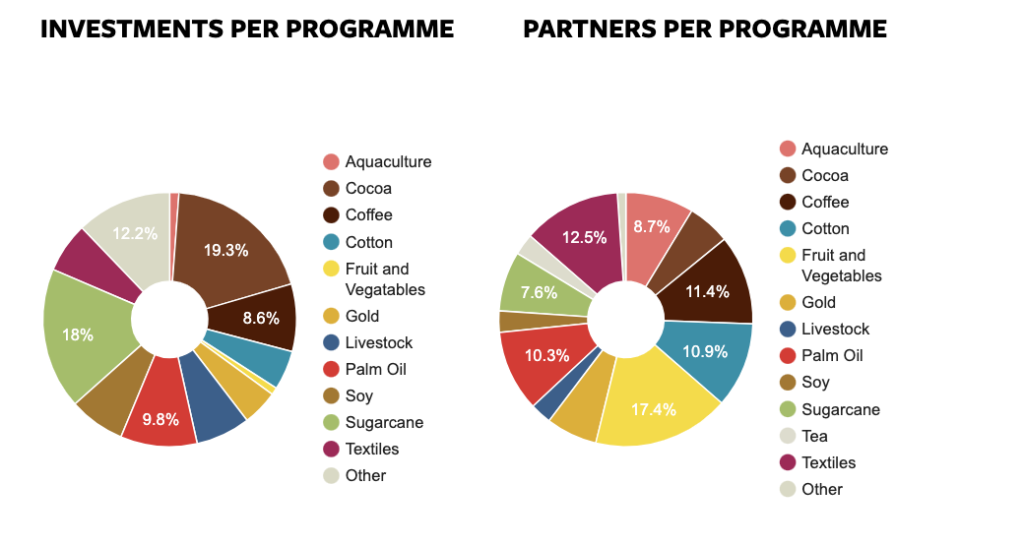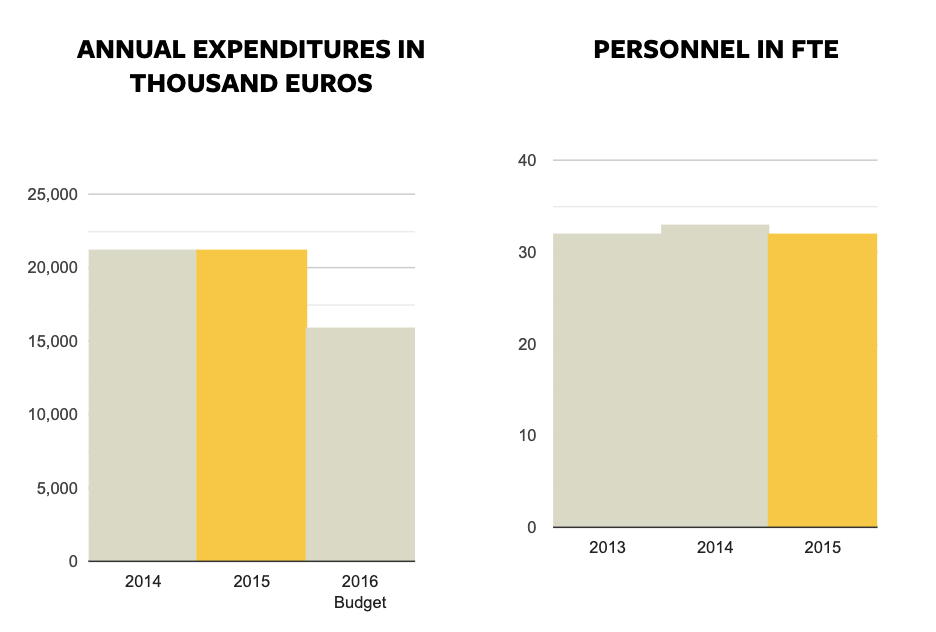REGIONAL COMMODITY PROGRAMMES
In 2015, Solidaridad’s aquaculture team in the Netherlands invested strongly in growing the Seafood Trade Intelligence Portal, which expanded its membership base and is preparing to launch new services in several countries. Private-sector companies are increasingly soliciting help with sourcing problems and the design and set-up of innovative pilot projects.

Developing life skills is a powerful tool for strengthening the (self) employment prospects and employability of the next generation in cocoa growing communities. Young people can learn to set up and run a viable business in cocoa farming or work as an entrepreneur in a cocoa growing communities.

In the Netherlands, the volume of certified coffee on the Dutch market (UTZ, Rainforest, FairTrade or Organic) has stabilized at 50%. We are now seeing a new trend where roasters set up and invest in their coffee supply chain with tailor-made sustainability programmes, instead of increasing the traded volume of certified coffee. As the Dutch coffee sector is the most advanced in certification, similar trends are expected in other European countries.

While the growth in production of more sustainable cotton is eminent, the uptake by retailers and brands is lagging behind. During 2015, Solidaridad raised awareness in the cotton and textile sectors to ensure sourcing is aligned with production.

In 2014 Solidaridad and FrieslandCampina Riedel launched a programme in Brazil to promote sustainability throughout the orange sector. Besides field activities, one of the main priorities was to engage all relevant sector players. Two years later, the first concrete step towards a sector-wide coalition has been taken with the development of a proposal to support 4400 producers in Brazil to move towards more sustainable production. Together they represent between 15 and 20% of orange concentrate production globally.

In 2015 Solidaridad took the lead in establishing a new responsible gold dialogue in the Netherlands, in collaboration with the Ministry of Foreign Affairs, private sector actors and other civil society organizations. The aim is to secure concrete commitments for improving the gold value chain. We also launched the Going for Gold campaign in collaboration with the Dutch Postcode Lottery. We enlisted a team of Olympic medallists to reflect on winning gold, both for themselves and for small-scale miners in Africa.

As Solidaridad’s livestock programme takes shape, cooperation with the private sector in livestock has slowly been developing. The recent increase in dairy production in Europe has made European companies more focused on exports and less on local sourcing or smallholder support. In beef, the role of European companies is much smaller.

A lot has been done at a global level to build sustainable palm oil supply chains. However, major issues such as deforestation and marginalization of small-scale farmers remain unaddressed. Clearly there is a need for increased and more exigent demand in the major markets. Solidaridad The Netherlands took first steps to unite the Chinese market in buying more sustainable palm oil.

In 2015 100% of the soy used for feed in the Dutch dairy sector (about 300,000 tonnes) was certified under the standard of the Round Table for Responsible Soy (RTRS). The criteria required this soy to be produced under responsible labour conditions and while protecting important habitats. The dairy sector is thus adhering to the Memorandum of Understanding on Responsible Soy that it signed in 2011 with Solidaridad and other NGOs.

More European companies are increasingly interested in sustainability of sugarcane production, but at the same time, their relative influence on it is decreasing. Solidaridad The Netherlands is mainly supporting corporate and non-corporate partners to be successful in production countries.

In the early years of Solidaridad’s textile programme we have shown, together with our corporate partners, that sustainability in the supply chain is possible. However, to achieve sector level transformation we need more brands to engage with sustainability and think about how they can be part of the solution through their design and purchasing practices. This has been the focus of the textiles programme for Solidaridad Netherlands in 2015.

DEVELOPMENTS
Europe is in turmoil. The EU’s relationship with member and non-member countries including Greece, Great Britain, Turkey, Russia and Ukraine is under severe pressure. Many citizens of Europe believe the EU can’t solve the debt crisis, refugee crisis and ongoing terrorism attacks.
The European economy is struggling; growth is weak and (youth) unemployment high. Even the extremely low interest rates, low energy prices and the broad currency creation policy by the European Central Bank could not bring economic growth in 2015 to a healthy level.
While Europe is dealing with its problems, populist and nationalist political movements are rising in many countries. Foreign aid budgets are under pressure and further spending cuts are foreseen since accommodation of refugees and military interventions are done at the cost of aid budgets. Isolationism is not the right path and will undermine global cooperation. Solving societal problems requires more Europe instead of less. More international collaboration and institutional reforms can create more democratic control and participation, which addresses people’s real concerns.
In the private sector, the Volkswagen diesel scandal, where supposedly environmentally friendly cars were poisoning the planet, created scepticism about self-regulation by companies and their CSR strategies. It shows how short-term thinking can blind companies to the reality of the future and can even destroy the value of a company. The limitations of CSR as a self-regulating tool highlight the need for more binding regulatory frameworks and enforcement of the law.
The role of good governance in shaping conditions for sustainable economic growth is more important than ever. The Paris climate agreement and the support for Solidaridad’s work by the Dutch, Irish and Norwegian Ministries of Foreign Affairs are clear signs of what is possible with governmental support. Finalized in 2015, the new multi-annual strategy of Solidaridad puts more focus on governments’ roles. Solidaridad believes the global economy is in need of sustainable leadership, both in the private and public sector.

ACHIEVEMENTS
Under the DSO funding scheme from 2016 to 2020, the Dutch Ministry of Foreign Affairs and Solidaridad will join forces to work on capacity building for sustainable sector transformation in selected agricultural, mining and industrial sectors and on the creation of sustainable management in landscapes of global importance. For a transition to socially and environmentally sustainable sectors, collaboration at landscape level and an enabling policy environment are key ingredients to support ongoing efforts for good practices in farming, mining and industry.
An example of the new landscape approach can be found in the Ganges River basin in India where 400 million people live and work in water intensive industries like leather production and sugarcane cultivation. A Dutch-Indian consortium will take the lead in cleaning up the Ganges River, taking advantage of important lessons learned in the clean-up of the river Rhine. Other regions where Solidaridad is active include the Kilimanjaro region in Kenya and Tanzania, the Chaco region in Paraguay, and regional projects in Honduras, Indonesia and Zambia.
The Norwegian government pledged grants for two new programmes. One of them aims to create further collaboration between governments, farmers and coffee companies in South America to shift coffee production and sourcing towards zero deforestation. In this programme, companies invest, farmers adopt and governments design policies for climate-smart agriculture.
The Dutch Postcode Lottery supported Solidaridad’s work with a total contribution of €3,441,401, including their annual contribution and support for the sugarcane programme.

PARTNERSHIPS
Solidaridad Netherlands works in 11 sectors and collaborates with private sector companies that commit to clean up their supply chains. Some of the highlights in 2015 were:
- Collaboration with 25 seafood companies from Germany, France, the UK, Denmark, Belgium and the Netherlands to improve the quality and sustainability of the shrimp and fish sector in Bangladesh.
- The buying and design teams of five textile brands were trained to increase their understanding of the environmental impact of textile wet processing. These training programmes generally received a strong positive evaluation.
- With Friesland Campina Riedel and a sector-wide coalition of partners, we took a first concrete step towards supporting 4,400 orange producers in Brazil. Together, they represent between 15 and 20% of orange concentrate production globally.
- The start of a new responsible gold dialogue in the Netherlands, in collaboration with the Ministry of Foreign Affairs, private sector actors and other civil society organizations.
- All soy used for feed in the Dutch dairy sector (about 300,000 tonnes) was certified under the standard of the Round Table for Responsible Soy (RTRS). The poultry and pork sectors inside and outside the Netherlands are still lagging behind and fail to honour their earlier commitments. There is one exception: Keten Duurzaam Varkensvlees who signed a three-year contract to help soy smallholders in Mozambique achieve RTRS certification.
Apart from the programmes mentioned in these examples, Solidaridad Netherlands holds programmes in the following sectors: Coffee, Cocoa, Cotton, Palm Oil, Sugarcane and Livestock (for meat and dairy).
ORGANIZATION
By the end of 2015, Solidaridad Netherlands employed 36 people, the same number as last year. During the year, there was an average of 31 full-time staff under contract (FTEs). In 2014, this figure was 31.5. Solidaridad has a salary structure based on job descriptions. The functions are weighed against the following four characteristics: knowledge and experience, independence, social skills and risks, responsibility and influence. Solidaridad’s pay structure follows the norms of the Dutch government for the public sector.
Through communication and campaigns, Solidaridad creates support for better policies, a sustainable supply base and financial support from private individual donors. In 2015, highlights included the successful Fair Sweater and Going for Good Gold campaign, a fair amount of publicity for the Cocoa Barometer report and the results from the partnership with H&M. We also concluded a successful launch of a photo exhibition on chronic kidney disease among sugarcane workers in the Central American sugarcane industry.
Solidaridad is a knowledge intensive organization with a highly motivated, well-educated and talented staff. Our main asset is our people. That’s why a talent management strategy linked to our organizational strategy is needed. In 2016, an operational manager with a strong background in HRM/TM and with dedicated time for these areas could bring Solidaridad to the next level in its human resource management.
The Annual and Financial Reports of Solidaridad Europe are published here.
